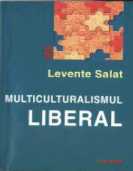
"The thesis of this book is Kymlicka's theory which provides a doctrinal basis that will help solve the "Madison question," Jefferson's, Tocqueville's and Mill's dilemma, and will enable us to identify the premises for democracy in a multicultural society".
This is how Mr. L. Salat describes the topic he will deal with in his book. The author asks himself whether democracy is in our days able to insure an equal proportional representation of the citizenship given the fact that there are countries characterized by a great cultural diversity, and in light of specialists conclusion that there is a huge gap between the interests of the communities and their actual representation at the institutional level. Mr. Salat believes that the theory proposed by the Canadian philosopher Will Kymlicka may offer a possible solution.
In the first part of his book, the author analyzes the ethno-political conflicts around the world, which have as background the claims made by various ethno-cultural groups, which come into conflict with the interests of the dominant group or of the nation-state; thus underlining the actual dimension of the problem. Mr. Salat then draws the readers attention to the theoretical framework employed by important researchers to describe and characterize ethno-political conflicts, as well as to the most frequent ways of managing and resolving these conflicts. In this writer's opinion, this section of the book is important because it makes one grow aware that ethno-cultural peace and world stability should be founded on the principles of ethno-cultural justice and equity.
Holding such a conviction, in the second section of his book Mr. Salat advances the discussion about Will Kymlicka's theory on multiculturalism. Kymlicka advocates a change of paradigm in international community orientation. He states that the traditional human rights can fully operate provided that these rights be improved by the addition to them of new community rights. Mr. Salat thinks that Kymlicka's liberal theory on minority rights is the sole solution able to accommodate the system of minority rights with individual human rights, and thus, able to explore the constraints which have to be imposed in order to enforce minority rights so that these rights will not transgress the principles of individual freedom, of democracy, and that of social justice.
The author goes on presenting the conceptual bases for Kymlica's theory. This terminology will enable analysts to grasp the meaning of the problem regarding ethno-cultural equality. Although multiculturalism is a feature of the contemporary world and stands for a reality which more and more
JSRI • No. 2/Summer 2002 p.206
people have grown aware of and recognize as such, when it comes to defining what multiculturalism is, one may encounter some difficulties, since it connotes various things to different people. With Kymlica, multiculturalism engenders a societal culture (inclusion of the institutions both from the private and public sphere within a predefined territory and a common language); the recognition of the right of minorities to their own societal culture, and realizing that different ethno-cultural communities need different kinds of rights which must be in accordance with their community features.
Mr. Salat underlines that Kymlica considers his liberal theory of minority rights an attempt in integrating within the framework of traditional liberalism the normative consequences of the forms of a differentiated citizenship which exist in contemporary liberal democracies. This stands for rethinking the liberal principles that are not seen in opposition with the minority rights, or specific group rights. This is viewed as the sole alternative for an effective equality between minorities and the majority.
An important aspect of ethno-cultural inequality and injustice is the fact that the members of the dominant cultures may freely enjoy cultural belonging, whereas the members of the minority cultures have to struggle in order to achieve it. A possible solution would be, to Kymlicka, the acceptance of cultural belonging as primary goods and also the system of differentiated rights. This writer's belief is that the liberal theory of minority rights is able to guarantee equality among groups, as well as freedom within the groups as it ensures the validity of the individual's principles of autonomy and social equity, corresponds with liberal values and eliminates dominance and oppression of one group over others. Moreover, ethno-cultural equity presupposes differentiated forms of citizenship; that is, the concept of citizenship is defined by its lack of unity in a world characterized by an ever increasing diversity.
However, Kymlicka's theory is submitted to harsh criticisms, which Mr. Salat does not overlook. He discusses them in the third section of his book. It is also in this section that the author discusses the influence and the relevance of Kymlicka's theory in the Romanian cultural context, and mentions several Romanian authors who have also elaborates studies concerning this theory.
The last section of the book deals with the normative consequences of the liberal theory of minority rights in contemporary political philosophy. The conclusion the author comes to is that the conditions for democracy becoming possible in a multicultural society are cultural freedom and a continuous negotiation of differences.
Mr. Salat's "Liberal Multiculturalism: the Normative Bases for a Genuine Minority Existence" is the first book in Romania which attempts to present and explain what liberal multiculturalism is about. By writing this book, Mr. Salat is trying to introduce a topical issue of political philosophy into the Romanian cultural context, and to integrate our culture among the world cultures.
JSRI • No. 2/Summer 2002 p.207
JSRI • No. 2/Summer 2002